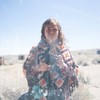I wouldn't say that my dad was an addict in the sense most people think of. He was absolutely an alcoholic for most of my life, and a recreational drug user. But you could say that about a lot of people. Half of my friends are recreational drug users.Out of both of my parents, my dad is the one who I connected with the most emotionally. So when I became old enough to realize he wasn't a real adult, that he was just a big kid, it rattled me. It made me feel bad about myself, because the things I liked about myself came from my dad.
Advertisement
He would sing, he was more creative, he appreciated arts and music. We would bake pies from scratch, pitch lemonade stands, create our own board games. If my eleven-year-old self said I wanted to write a book, he'd be like “Great, what's it going to be about?” He really encouraged my artistic endeavours. And yet he turned out to be—not a disappointment—but the irresponsible one.I was still a kid when I decided I didn't want to go to his house anymore because it just felt uncomfortable. It's like hanging out with a drunk person when you're not drunk. He wouldn't remember anything I said. We'd have the same conversation over and over. Even if we made plans to have breakfast together, if they weren’t serving beer yet, we'd have to go somewhere else.
I didn't know how to communicate with him, and so the easiest thing to do was to not communicate with him. It was a way to protect myself emotionally from having a parent that was really entrenched in alcoholism and drug use. I was already struggling with my own shit, and piling on other people's shit is just really hard.I would have conversations with my mom where she'd ask, "How's your dad?" and I'd say I talked to him the other week, not so great. She'd say, you know, one day you're going to get a really bad phone call. I knew this was going to happen, and then last year I got that call. I talked to the coroner, who told me it was an overdose, which is fully what I expected to hear.
Advertisement
I only have one or two good portraits of my dad. I never really photographed him while he was alive. It was such a tragic and complicated and hard thing. When he died, it was just an instinct for me to grab my camera. It was my way of expressing myself, of dealing with things. It just seemed like a natural thing to do, to start documenting.I went to the place where he died. The thing that fucked me up the most was not that he had died—it was something I had expected for years—it was his living conditions. When we still talked, he was living in a little apartment in Marpole, he had neighbours and a little patio, and everyone knew his name. So I thought he was OK. But he spent his last three months at the Murray Hotel, which is one of the worst single-room occupancy hotels—it's a really rough place.
There were mice and cockroaches in the room, he didn't have a bed, he was just sleeping in a sleeping bag on the floor in a tiny room. I've seen these things before in my work with marginalized individuals. I knew how shitty SROs could be. I have so much sadness for the people who live in them, and I wonder what else I can do. It just takes you so much deeper into it when I you realize, "Holy fuck, my dad lives in this."I'm doing double exposures, which is different than what I normally do. It seemed to be the best way to show what I was thinking, just overlapping thoughts that make no sense. Things are slightly askew and jarring. That's what I was thinking and feeling—jarred and confused. It helped my grieving process—I needed something to focus on. It gave me a reason to hop on my bike and visit his old apartment, the parks we used to visit, anything that reminded me of him.
Advertisement
I think that we are both in these photos, in a way. I took photos of old cars, of plants, of things that remind me of him. There were so few things that I recognized in that room, but one happened to be a Vancouver mug I'd given to him. In his room the TV and the radio were both on—which is totally my dad. It would all bring up memories of us together, so I feel like in that way each photo has a piece of him and a piece of me.I wouldn't say that this SRO killed my dad. My dad had a lot of faults. He took the drugs. He was living a lifestyle that was risky. But I think the place augmented his need to feel less hurt. My dad's best friend Vince said the last time he spoke to my dad was the night he died. He was so frantic about where he was living. Vince never heard my dad express himself that way. My dad was always positive, no matter what. It was the first time he sounded scared. I wish that he had called, but I also wonder what I could have done for him.My dad was a great guy. He was super friendly, everyone I spoke to after he died said he was like a ray of sunshine in my life. People really loved him. I just somehow want to convince people that there's more than one kind of person living in an SRO, and there more than one kind of person dealing with addiction.
Follow Jackie on Instagram.Sign up for the VICE Canada Newsletter to get the best of VICE Canada delivered to your inbox.

